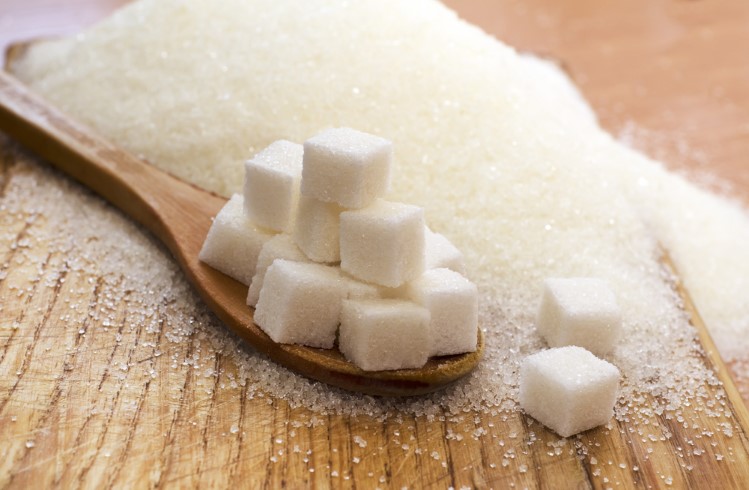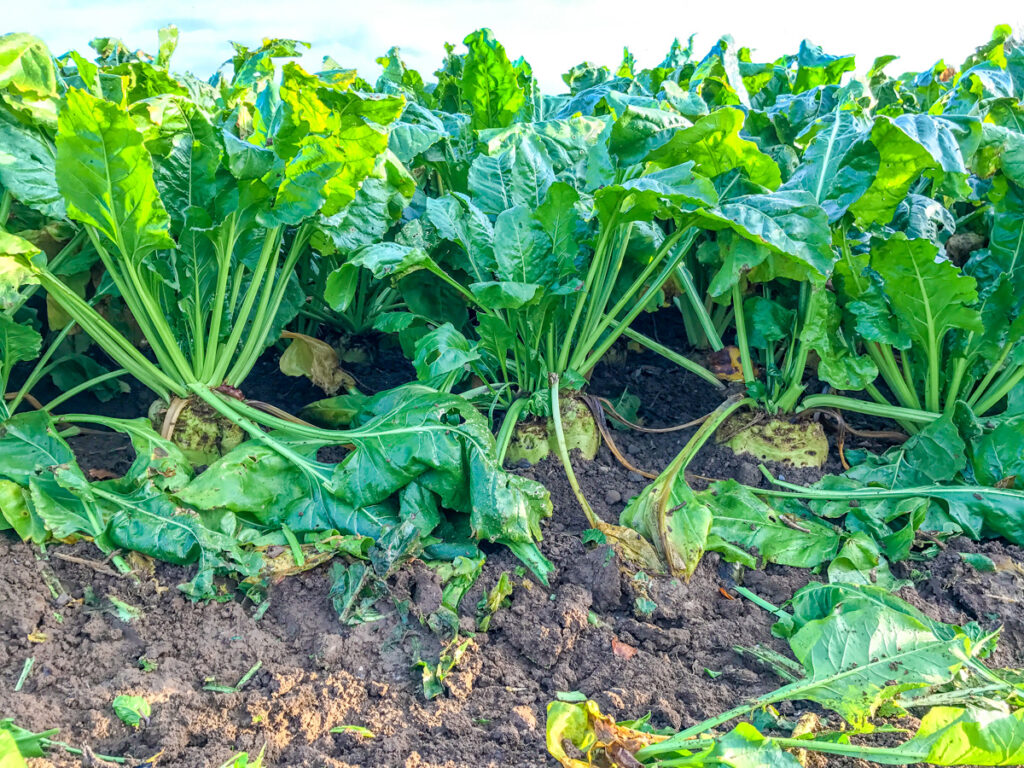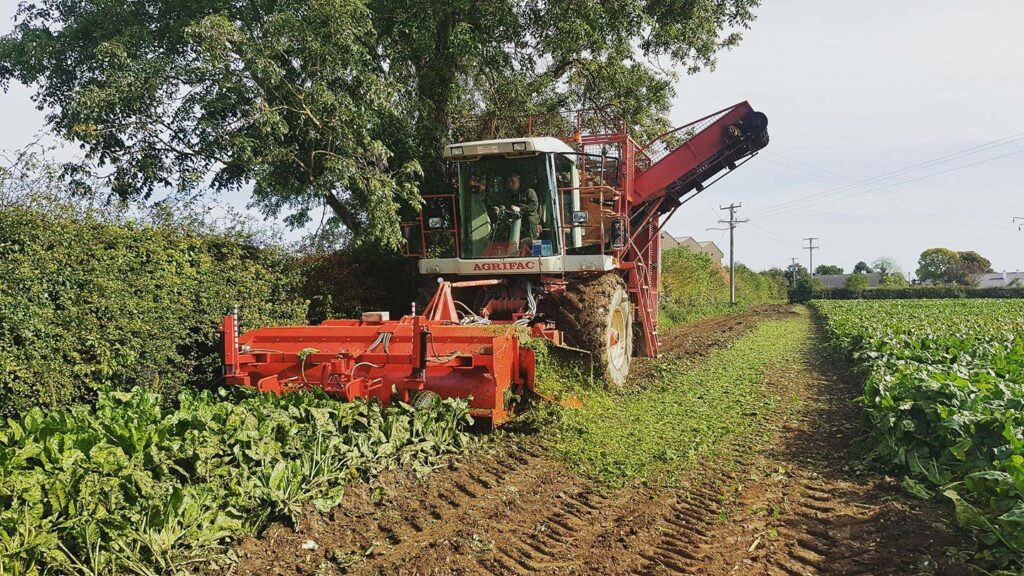Enthusiasm and belief are two words that sprung to mind when Chris Harmon, a director of Beet Ireland, spoke to AgriLand ahead of the groups first meeting with potential growers.
He has a dream – to drive along the M9 motorway in a few years time when one of Europe’s most efficient sugar plants is up and running and be able to say that he played a role in what could be a big part of this country’s history.
He, along with his colleagues, wants to revive the beet industry and see Ireland’s farmers take that journey with him.
We believe that we can build the most efficient sugar plant in Europe.
“That gives you a competitive edge. If we didn’t believe that we could deliver this project, I wouldn’t be sitting here talking to you today and I wouldn’t be down in beautiful Carlow talking to growers,” stated Chris.
Meeting growers
The first meeting took place in the Talbot Hotel in Co. Carlow, just a couple of hundred metres down the road from the entrance to the old sugar factory site. The tower from the old plant still looks out on Carlow town and was visible from the hotel where the meeting took place.
“It’s quite significant that we’re having our meeting here and we will be having a number of meetings here over the next few weeks and months.
“The plan is that by the end of this year, we will have conducted our grower engagement and hopefully there will be enough engagement and commitment from growers to take the project to the next stage.
Central to the business model of Beet Ireland was always the beet grower. We realise that this is a single raw material industry and you need growers to grow the beet.
Commitment in the form of €1,000
Growers who wish to be involved in the project are being asked to pay €1,000 to subscribe to and become a member of a co-operative. Further investment will be needed from growers as the project moves past the planning stage.
“It is really about getting grower commitment, because if we can’t get grower commitment this project is not going to be a runner.
The best way to get real commitment from anybody is for them to put money on the table.
“Beet Ireland has put a lot of money on the table in acquiring a site, just up the road here in Ballyburn. We’ve made our commitment and we are very committed to delivering this industry.
“We believe there is a huge opportunity for the tillage sector in Ireland to get behind this project and really it is about financial commitment.
I know €1,000 is a lot of money, but, in the context of where we’re going, it’s a very small commitment.
“We’re looking for 1,000 growers to contribute €1,000; which is €1 million. If we get 1,000 growers to commit, we’re going to go onto the next phase of the project which is the planning for the site, attracting other capital investors to the project and putting bank funding in place.
“That money will be used by the co-operative to acquire shares in a new company that we’re going to create (independent of the co-op and Beet Ireland); a brand new company that is going to be the new organisation that will deliver the sugar industry for Ireland.”
As Chris puts it, once the growers are involved they will be on the road to delivering the industry.
“We believe we can get up to 60% debt funding on this project and the rest will then have to be funded through equity and – in order to retain a significant stake within this industry – growers will be asked to contribute more. What the level of that contribution is really depends on the capital that we can get into the project.”
Further investment
Chris was unable to say how much more money growers will need to invest.
It’s a very difficult question to answer, but the beauty of what we’re doing is that we’ll be discussing it with growers inside a room on the basis that they have committed to the project.
“We see this at the very outset being a joint venture; growers will commit €1 million and we [Beet Ireland] will commit €1 million in terms of land value.
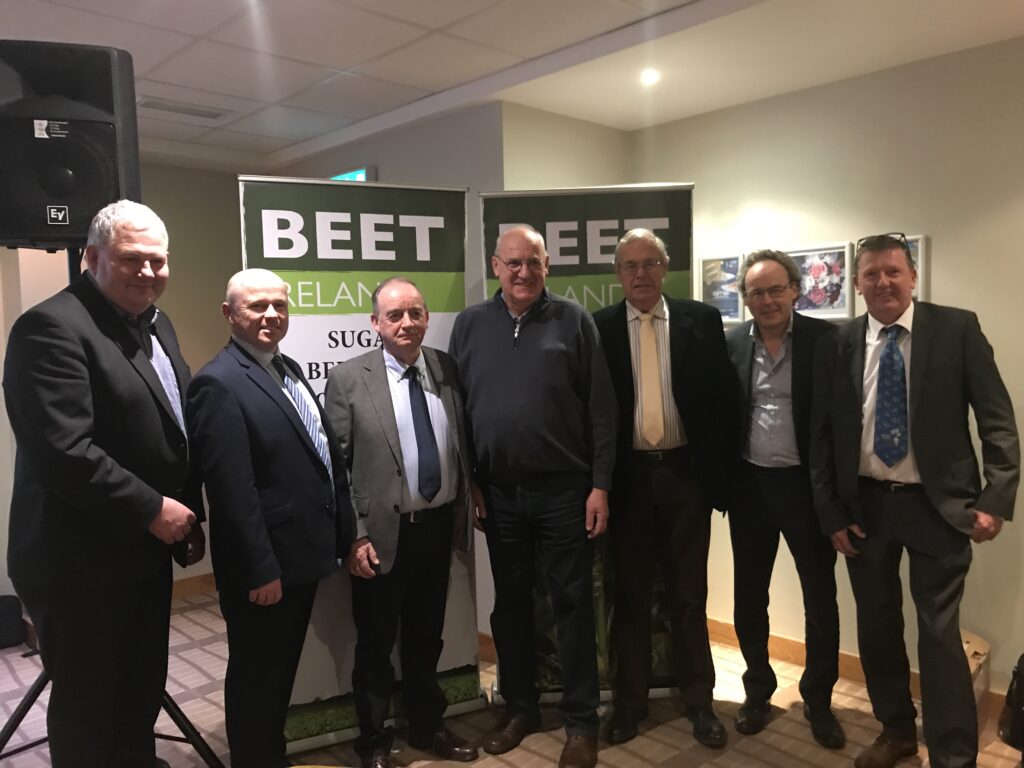
From L-R: Michael Hoey; Chris Harmon; Pat Cleary; Hugh McDonnell (Irish Tillage and Land Use Society president); Jim O’Regan; Brian Arnold; Simon Cross
“This is very much a 50/50 joint venture and partnership between us and the growers. Whether that’s maintained going forward is very much dependent on who’s putting money and equity on the table.
“As that evolves, growers will be involved in the evolution of that partnership, but at the very start it will be a joint venture between Beet Ireland and the growers.”
Sugar will be the main product
Continuing, he said: “There are three core elements; if you look at the sugar industry across Europe, the primary product is granulated or refined sugar.
“We also have an opportunity on the ethanol side, but it’s a very small part of our business case at this moment in time. We do see huge growth potential in that industry; the third part is beet pulp.”
Bio-polymers
Polymers and bio-polymers are used to create bio-degradable packaging. Chris explained that this could be another by-product of the sugar industry.
“There’s some very interesting research going on in Dublin by Prof. O’Connor in the Amber Institute, who has found that by combining certain bio-polymers with petrochemical polymers, you can make polymers compostable within a domestic composter.
“This is groundbreaking research, because – to date – while some are biodegradable, they can only biodegrade under intense heat.
“Sugar will play a key role in that going forward, just like other starch based plants, because one of the most widely used polymers is produced from starch and sugars.
It’s a high-value item. We import over €800 million worth of polymers in primary form into this country every year.
“There is a whole revolution going to happen in packaging over the next 10 years and bio-based polymers are going to play a key role in that,” Chris added.
“It’s important to get the message out there that the sugar industry is a very different industry now. It was all about producing sugar as cheaply as you possibly could and sell it as a commodity onto the world markets.
“Sugar is evolving now into other revenue streams like I’ve discussed and will continue to play a key role, not only in Ireland, but also in Europe.
“If you look at sugar it’s a very difficult product to transport. If you look at ethanol, it’s a very dangerous product to transport across open water and if you look at polymers, nearly all of it is imported into Ireland.
“The fact that we’re an island gives us a competitive advantage straight away by producing those products.”
Beet price
Sugar is a commodity like barley or wheat and Chris emphasised the benefits that growing sugar beet can have on farm incomes, away from the price per tonne. He described the importance of collective buying power.
“We can’t tell people what we’re going to be paying them for beet, just like no one will be telling farmers what they will be paid for barley or wheat in a years time; but what we can talk about is the model that we’re going to propose to growers in terms of what return they’re going to get.
Obviously getting a price for your beet ex-farm is one revenue opportunity; the second revenue opportunity is around the improved yields you can get by having sugar beet as a rotational crop.
“The third opportunity is a dividend from holding shares in the value-added company; the fourth is around entitlements and the fifth one – which a lot of growers struggle with at the moment – is collaboration.
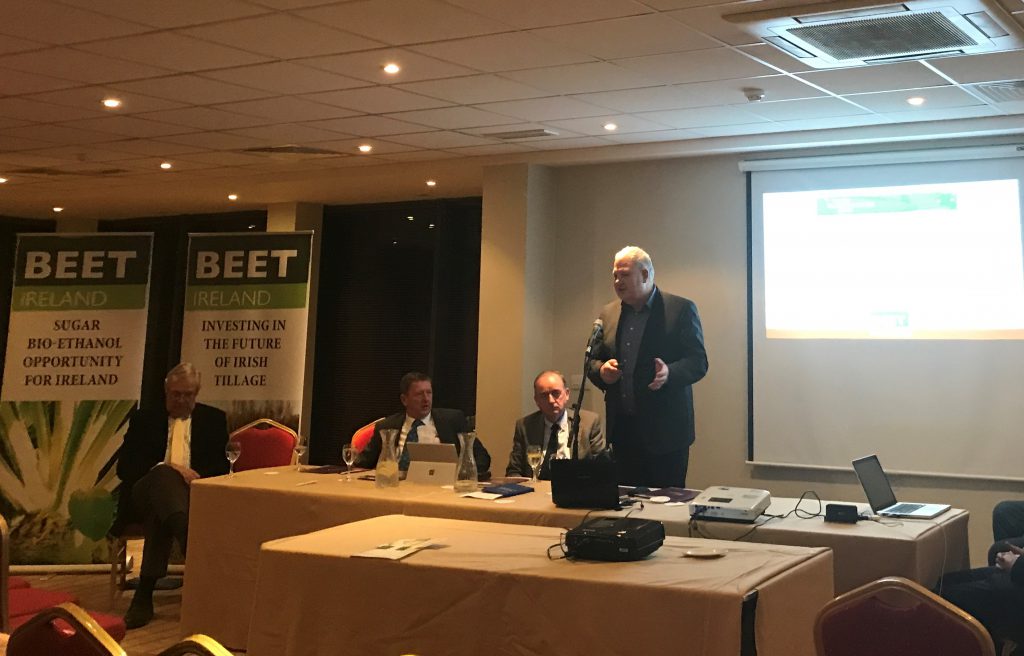
Michael Hoey – one of the six directors of Beet Ireland – speaking at the Beet Ireland meeting held in conjunction with the Irish Tillage and Land Use Society on Wednesday night
“This collective buying power – putting a co-operative together, being able to buy fertiliser and crop inputs, lobby as a group, train and understand each others challenges and have a conversation with a fellow grower.
The big difference here is we want beet growers inside the gate of the factory looking out, rather than outside the gate looking in.
Fodder beet currently selling for €55/t
AgriLand asked Chris why beet growers would supply a plant which may be paying a lot less than current prices available for fodder beet.
“It’s a challenge. There are fodder beet growers out there that are getting very good returns. I suppose it’s predicated on the strength of the dairy industry, lets be honest about that, and please God the dairy industry will remain strong; but any business person will tell you that putting all your eggs in one basket is not a good thing to do.
“We can offer growers an opportunity to grow a much bigger quantity of beet and market access for their beet. We can’t offer certainty around price, nobody can offer that in any facet of agriculture, but we can deliver a multifaceted return for the grower.
“It’s much more than just growing the beet and taking a price. Fodder beet growers are still price takers at the end of the day. The price is high because there’s a demand, but can that be sustained in the long term? Probably not,” he commented.
Rare opportunity
Chris, clearly excited about what might lie ahead for the beet industry, hopes that farmers will take this opportunity.
How many opportunities like this arise in the agricultural industry? Very, very, few where growers are being invited to participate in a value-added opportunity.
“The big challenge for growers is that they’re price takers. They’re stuck in the primary production part of the value chain. Growers, just like the dairy industry has proven, need to move up the value chain and I think they realise that this is what they need to do.
“This is giving them an opportunity to do that and all we’re asking them for is €1,000 at the very, very start to get on board and help us deliver this industry for them.
“As business people, we’re not going to hide the fact that we see an opportunity in this, but really this is much more about the growers, the tillage sector and the opportunity that growing sugar beet can bring to growers and to agriculture.”
Agronomy and machinery
Since 2006, much of the machinery used in beet production has made its way out of use. A large investment would be needed on this front if the sector is revived.
Chris explained that there would be an integrated supply chain approach where inputs come from the new company and contractors look after the field work. While growers will still be able to make decisions in the field, there will be less involvement on farm.
“There is an appetite out there for farming contractors to invest in beet equipment, but the sugar industry has moved on since 2005.
“The industry takes control of the supply chain from farm to factory. It will be this new company that will procure the service of a farming contractor, that will purchase the seed and make it a seamless process. We’re asking growers to make land available and to grow the product.”
Growers from a 60km radius
Chris explained that growers supplying the beet plant will ideally be located within a 60km radius of the site.
The site we have is located in Ballyburn, between Castledermot and Carlow town. Ideally, we’re looking for growers within a 50-60km radius of the site.
“That doesn’t mean that we’re not going to have growers outside of that radius. A lot of the beet grown in the past came from Co. Cork and Co. Wexford and those areas can’t be ignored, but there is an economic imperative for us to have our beet grown within that 60km radius of the site – north Wexford, Co. Carlow, Co. Kildare and Co. Laois.”

Brian Arnold, a director of Beet Ireland, spoke to AgriLand at the National Ploughing Championships in September. He announced that the group would be holding growers meetings at the time
Funding from outside investors
€300 million will be needed to plan for and build the new beet plant. Chris explained that there are people out there willing to invest.
“There are organisations and people out there that we believe will invest in this project. The caveat for us is that we get grower commitment from the start because nobody is going to invest money in this project if growers are not committed from the very outset.
“We do understand this industry quite well. We’re involved in the agri-food industry ourselves.
We’re talking to people who are not going to be growing beet, but who may look at this as an opportunity to invest.
“We also believe that there are funding streams available to us that may not be available to other large-scale industries because this is a particular infrastructural type of development.”
A factory in 2022
Chris added: “On the basis that, by the end of this year, we have grower commitment, between getting planning permission and building the site, you’re probably looking at a three-year time frame.
“All going well, in 2022 the factory will be ready to produce sugar,” he concluded.



